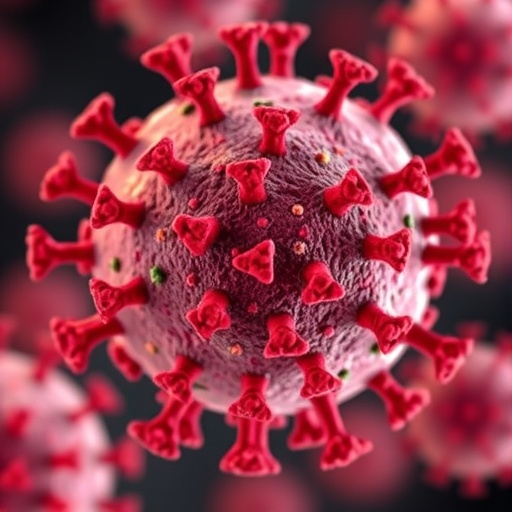In a groundbreaking study that highlights the impact of historical coronavirus epidemics, researchers have unveiled insights into the genetic consequences of natural selection in populations affected by these diseases. The work, conducted by a team inclusive of notable scientists such as Morris, Lin, and Millwood, uses two extensive biobanks: the China Kadoorie Biobank and the UK Biobank. This comparison provides a unique vantage point for understanding how ancient viral outbreaks may have shaped the genetics of human populations over time.
The study emphasizes the dual role of viruses in not only causing disease but also in driving evolutionary change. By analyzing genetic variations prevalent within the populations represented in both biobanks, the researchers were able to identify specific genetic markers that have been positively selected due to historical exposure to coronaviruses. This phenomenon, known as “selective pressure,” plays a critical role in shaping the human genome, especially in response to persistent threats from infectious agents.
The methodology employed in this study involved a comprehensive genomic analysis that spans decades, allowing for the identification of long-term genetic adaptations. The researchers meticulously examined the alleles present in the genes, which are known to relate to immune response and susceptibility to viral pathogens. These findings suggest that certain populations may exhibit genetic advantages that could enhance their survival during past epidemics.
Moreover, the researchers made a compelling case for a correlation between geographical lineage and genetic resilience against coronaviruses. Individuals from regions in China that had previously experienced severe outbreaks displayed significant variations in their genetic makeup when compared to those from the UK, who were subjected to different viral exposures. This geographical variation underscores the complex relationship between humans and the pathogens that have historically plagued them.
The implications of these findings extend beyond mere academic curiosity; they provide crucial insights that may inform public health strategies today. Understanding how human populations have genetically adapted to viral threats in the past can aid in developing targeted therapies or preventive measures for future coronavirus outbreaks. It reveals a broader evolutionary context within which current and emerging public health challenges can be understood.
In addition to the genetic analyses, the researchers conducted robust statistical models that accounted for environmental and lifestyle factors that could influence health outcomes. By controlling for these variables, the team was able to draw more accurate conclusions about the direct effects of natural selection exerted by historical coronavirus epidemics. Such rigorous methodology ensures the reliability and validity of the research findings.
The study also poses intriguing questions about the future of genetic research in the context of pandemics. As the global population continues to face new and evolving viruses, it becomes increasingly important to consider the role of genetics in disease susceptibility. This research serves as a foundation for future studies that may seek to uncover additional layers of complexity regarding human adaptation to viral threats.
Furthermore, the researchers hope that their work will inspire a new wave of genomic studies that not only focus on contemporary pathogens but also consider historical context. By integrating lessons from the past into modern biomedical research, scientists can create more effective strategies for combating viral diseases. This approach represents a paradigm shift in how scientists view gene-environment interactions in the context of infectious diseases.
Through meticulous research and innovative methodologies, Morris and his colleagues have shed light on the interplay between genetics and history in the context of emerging viral threats. Their work exemplifies how understanding the past can provide vital insights for the future, illustrating the resilient nature of human genetics in facing the ever-present challenge posed by infectious diseases.
As this research gains traction, it is likely to spark further discussions about the implications of genetic diversity in response to public health crises. Future research may explore how lessons learned from these historical epidemics can be applied to current-day scenarios, especially as the world remains vigilant for new coronavirus variants.
In conclusion, the work conducted by Morris, Lin, and Millwood contributes to a deeper understanding of the genetic legacy left by historical coronavirus epidemics. It situates current public health efforts within a broader evolutionary framework, reinforcing the notion that genetics plays an indispensable role in our response to infectious agents. As this knowledge continues to evolve, it is imperative that the scientific community maintains a commitment to integrating historical perspectives into modern health paradigms.
Understanding our genetic heritage may not only inform treatment strategies but could also guide future research toward sustainable solutions that ensure the health of future generations. The synergistic interplay between historical data and contemporary science paves the way for an informed approach to addressing viral challenges that remain ever-prominent in today’s world.
The research ultimately calls for a holistic vision in tackling public health issues, emphasizing the importance of learning from both our genetic past and the pathogens that have historically threatened human well-being. As we grapple with the complexities of viral diseases, this kind of integrative analysis will be essential for advancing our understanding and responses to future health crises.
By studying the echoes of our genetic past, we may find pathways to a healthier future, armed with insights that bridge history, genetics, and emerging public health challenges.
Subject of Research: Genetic Adaptation to Historical Coronavirus Epidemics
Article Title: Natural selection exerted by historical coronavirus epidemic(s): comparative genetic analysis in China Kadoorie Biobank and UK Biobank.
Article References:
Morris, S., Lin, K., Millwood, I.Y. et al. Natural selection exerted by historical coronavirus epidemic(s): comparative genetic analysis in China Kadoorie Biobank and UK Biobank.
BMC Genomics 26, 943 (2025). https://doi.org/10.1186/s12864-025-11876-4
Image Credits: AI Generated
DOI: 10.1186/s12864-025-11876-4
Keywords: Genetic Adaptation, Coronavirus, Historical Epidemics, Biobank, Natural Selection, Immune Response, Public Health, Viral Threats.




